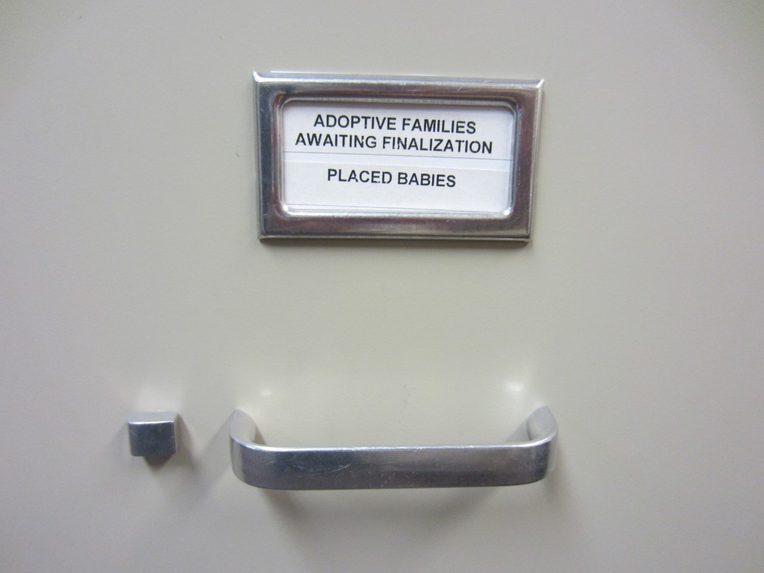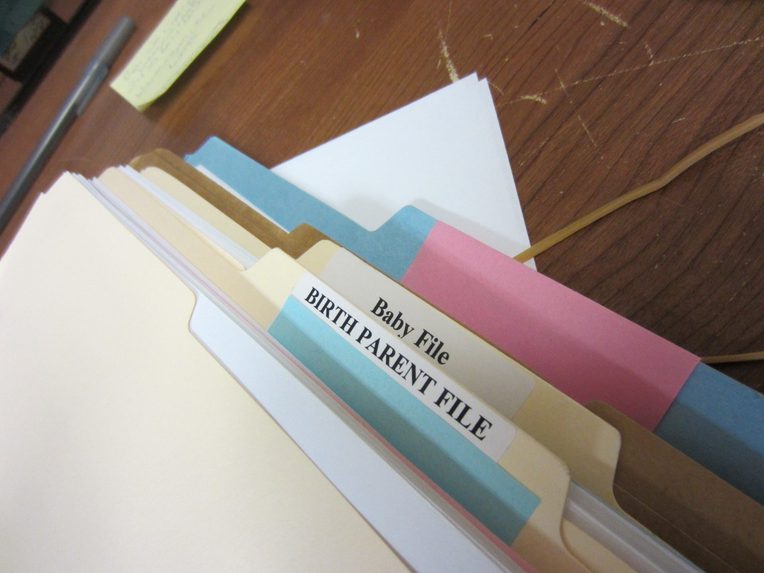
This post builds on the research article ““Who you are in these pieces of paper”: Imagining Future Kinship through Auto/Biographical Adoption Documents in the United States,” which was published in the November 2019 issue of the Society’s peer-reviewed journal, Cultural Anthropology.
This post will present a lesson plan and short author interview to accompany Kathryn Mariner’s article “‘Who you are in these pieces of paper’: Imagining Future Kinship through Auto/Biographical Adoption Documents in the United States” published in the November 2019 issue of Cultural Anthropology. Through an auto-ethnographic activity and discussion questions, the lesson plan will facilitate the use of this article for teaching undergraduate students the anthropology of kinship, as this field intersects with studies of paperwork, temporality, and race and class inequality.
Lesson Plan
Pre-Class Activity: Your Documentary Biography
In addition to reading Mariner’s article, invite students to collect a list of important biographical documents that they keep with them, in paper or electronic form. You may wish to encourage them to bring samples of physical documents, if they have them easily accessible and feel comfortable bringing them to class. Students should think creatively and expansively about what might constitute a biographical document within their own personal archive. For example, in addition to birth certificates or identification documents, a college acceptance letter, family photos or correspondence, baptism certificates, mementos or programs from significant ceremonies, or transcripts from school or standardized tests might be among the documents they select. Emphasize that students should try to come up with at least five to ten items but that they need only note down those documents they feel comfortable discussing with their peers.

Small-Group Discussion
At the beginning of class, divide students into small groups of three to four to share their lists and documentary artifacts. Invite them to compare their lists with other group members and reflect on the following discussion questions together:
- How do differences in the lists you assembled speak to differences in your biographies? What political and economic structures do you see at work in these differences?
- Besides your own, whose names and/or images appear in your documents? How do these documents link your biography to those of other people?
- Which documents do you keep a paper copy of? Which do you store electronically? What differentiates the two categories for you?
- To what different time periods in your life do these documents refer? Do they make connections between different times or temporalities?
Class Discussion
After small-group discussion, invite the groups to join a larger class discussion in which they use their personal documentary archives to reflect upon and expand the key ideas from Mariner’s article.
- In Mariner’s study of open adoptions, how do race and class shape the relations between persons and documents? Did you find similar or related patterns in your group discussion?
- Explain Mariner’s concepts of pre-kinning and re-kinning. How might these terms, or other kinship verbs, help clarify the processes going on in your own biographical documents?
- How does Mariner use the idea of temporal folding to explain the work of adoption documents? Did your groups encounter examples of temporal folding in the documents you discussed? What other kinds of temporal relations were established or implied in your documents?
- How do you understand the “work” in “paperwork”? What is significant about the pairing of physical documents and their associated productive labors?

Author Interview
Isabel M. Salovaara: This article and the larger project of which it is a part—including your book, Contingent Kinship (University of California Press, 2019)—suggest the continued vitality of an old but also contentious subject of anthropological concern. Could you speak to why kinship as a field, as well as specific re-thinkings like your layered concept of (p)re-kinning, remains compelling for anthropologists to study and teach?
Kathryn Mariner: I think kinship (or even human relatedness, however broadly defined) remains compelling because like all social formations it is dynamic and ever changing. It is also deeply inflected by—and in turn, deeply inflects—other fields and practices anthropologists hold dear, like gender, economics, religion, politics, race and ethnicity, identity, and as I point out in the article, temporality. I can’t imagine a human world without kinship. As Donna Haraway (2016) has recently pointed out, making kin—though not necessarily baby kin, and not always human kin—is an ethical imperative if we are to continue surviving on this damaged planet. The trouble with kinship as a "field" as many anthropologists have argued since David Schneider’s (1984) seminal critique, is that it isn’t the same everywhere, it is wildly slippery and unwieldy, and our understanding of it is often imbued with Eurocentric bias. This messiness is why I think it is vital to keep studying and teaching about kinship—we really haven’t quite figured it out yet, and the stakes are higher than ever.
IMS: Your autobiography is enfolded into this piece and its larger project. Could you speak a bit about how ethnographers, including student ethnographers, might hone reflexive autobiographical engagement as a tool for fieldwork and analysis?
KM: This is something I’m working on all the time. In the same way that I can’t imagine a world without kinship, I’m not sure I know how to write ethnography without personal investment and connection. For my work on transracial adoption, the connection was visceral since I am an adoptee of color and also trained in clinical social work. But I think all anthropologists can benefit from reflecting on what connects and draws them to their research subjects, even if the personal connection is less obvious. The ethnographer is the instrument. We see, we experience, we share, we learn, and then we write (or we’re writing all along). As a personal practice completely outside of my work, I journal every day, which means that I write about myself every day.
In the paperwork article, I was able to write about my own photograph as an additional data point that became interwoven with the documents of one of my interlocutors, but even in the absence of something like that, an ethnographer should always be thinking about how their own experience, history, identity, and very presence is helping to inform and produce what they are analyzing in the field. The trick is learning what parts of that interplay are relevant for the reader (as I have discussed elsewhere [Mariner 2019], identifying when it becomes evidence). It’s not enough to simply recount one’s journey, whether intellectual, emotional, psychological, or spiritual. I think it’s also really important to remember that auto-ethnography, autobiography, reflexivity, and memoir are not the same thing. Auto-ethnography is a particular way of theorizing the self and of elevating particular subjugated discourses (McClaurin 2001). We know that monolithic notions of identity and "native" anthropology collapse a great deal of complexity.
IMS: As you mentioned, you studied clinical social work in addition to your training in anthropology. How has this pairing shaped your anthropological sensibilities and research process?
KM: Since my anthropological training and my social work training occurred simultaneously, it is difficult to know how I might operate differently if only trained in one or the other, but I can at least say that I have often thought of my social work expertise as a kind of field language, and am increasingly coming to understand anthropology as a kind of "social work by other means." I use my social work skills all the time, both in the field and in the classroom, helping students identify problems and build life skills, fostering a sense of inclusive community, connecting interlocutors to resources in times of need and crisis, offering a shoulder to cry on, trying to design research projects and courses around broader social justice goals (these are things many ethnographers do, with or without MSWs, of course). My background in social work helps me work toward what others in the field have called “an otherwise anthropology” (McTighe and Raschig 2019) by striving toward a praxis that combines theory and action.
IMS: This article advances recent anthropological conversations about the significance of paperwork by drawing our attention to documents’ mediation of temporal relations. Here, the scale of the futures anticipated or folded into adoption documents is relatively small and intimate. Do you think that a similar approach might illuminate the kinds of work needed to concretize other kinds of imagined futures—for instance, of climate crises—perhaps on global scales?
KM: In the article, I argue that documents are a particularly useful lens to think about the temporal relationship between human subjectivity and relatedness and increasingly powerful and pervasive bureaucratic apparatuses. And I think a lot of the existing work on documents does make arguments, particularly about state power, at a much larger scale. I can think of a really potent example from my current research on the politics of race and place-making (fertilegroundroc.org) that illuminates the role a document can play in a collectively imagined future at the scale of an entire city and beyond. Rochester, New York’s new comprehensive plan, “Rochester 2034,” is a 450+ page document that sets a course “to improve our community” by the two hundredth anniversary of the city’s incorporation. It includes a climate action plan to reduce greenhouse gas emissions, in which Mayor Lovely Warren writes, “we expect our local efforts to have a global impact.” It is easy to imagine an ethnographic analysis of the document and its multiple visioning processes—and all the other supporting documents involved—that elaborates and rescales some of the arguments anthropologists have already made about documents, the state, and collective local and global futures. Documents, in their myriad forms—no pun intended—are potent ethnographic artifacts for illuminating complex and crucial relations of power in a range of contexts.
Supplemental Reading
Hull, Matthew S. 2012. “Documents and Bureaucracy.” Annual Review of Anthropology 41: 251–67.
Kim, Jaeeun. 2011. “Establishing Identity: Documents, Performance, and Biometric Information in Immigration Proceedings.” Law and Social Inquiry 36, no. 3: 760–786.
Leshkowich, Ann Marie. 2014 “Standardized Forms of Vietnamese Selfhood: An Ethnographic Genealogy of Documentation.” American Ethnologist 41, no. 1: 143–62.
References
Haraway, Donna. 2016. Staying with the Trouble: Making Kin in the Chthulucene. Durham, N.C.: Duke University Press.
Mariner, Kathryn. 2019. “Kathryn Mariner’s Contingent Kinship.” Anthropology News website. April 18, 2019.
McClaurin, Irma. 2001. “Theorizing a Black Feminist Self in Anthropology: Toward an Autoethnographic Approach.” In Black Feminist Anthropology: Theory, Politics, Praxis, and Poetics, edited by Irma McClaurin, 49–76. New Brunswick, N.J.: Rutgers University Press.
McTighe, Lauren, and Megan Raschig. 2019. “Introduction: An Otherwise Anthropology.” Theorizing the Contemporary, Fieldsights, July 31.
Schneider, David M. 1984. A Critique of the Study of Kinship. Ann Arbor, Mich.: The University of Michigan Press.